Children are prevented and protected from exploitation and abuse
Child protection is a major concern in Nepal. Specifically, child labor and child marriage are rampant across all communities, geo-ecological zones, and religious/ethnic groups. 32.8% of females and 9% of males are married before the age of 18. Child marriage is not only a violation of several rights of children outlined in CRC, but it also has severe implications for the child’s health, particularly the child bride. Child labor is also a major protection issue in Nepal. An estimated 286,000 children under the age of 17 are involved in waged labor (Nepal Labour Force Survey Report 2017/18). Child labor deprives the children of their rights to have education and health care services and also hinders their physical, mental, spiritual, moral, and social development. Children because of their age and limited physical development are vulnerable to abuse and exploitation.
Outcomes |
||
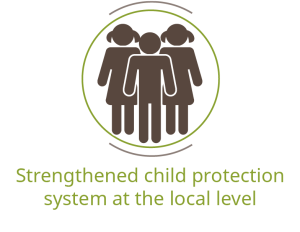 |
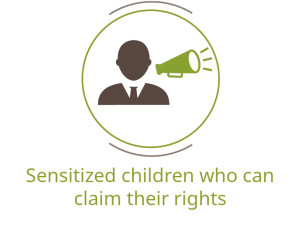 |
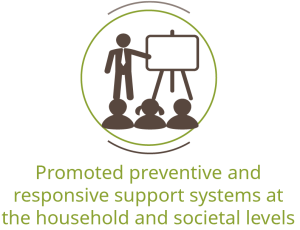 |
Strengthened child protection system at the local level
Although there are a few organized committees, networks, and well-informed community members at the local level; however, they are not functional due to limited knowledge of child rights and child protection. Hence, these committees require technical assistance, capacity development support, and exposure to child protection systems. Similarly, child protection policies, systems, and mechanisms have not been adopted and adequately defined by many local governments.
Formation/re-formation of child protection committees at the community, rural municipality, and municipality levels assists for institutionalizing duty bearers’ roles and responsibilities. Capacity development interventions for child protection committee members, local government officials, and other actors help them to get educated on key child rights issues, respond to child protection issues, and facilitate case management. Interventions that are based on research/assessments support formulation and implementation of child protection policies/guidelines and will contribute to institutionalize and sustainability of grassroots child protection systems.
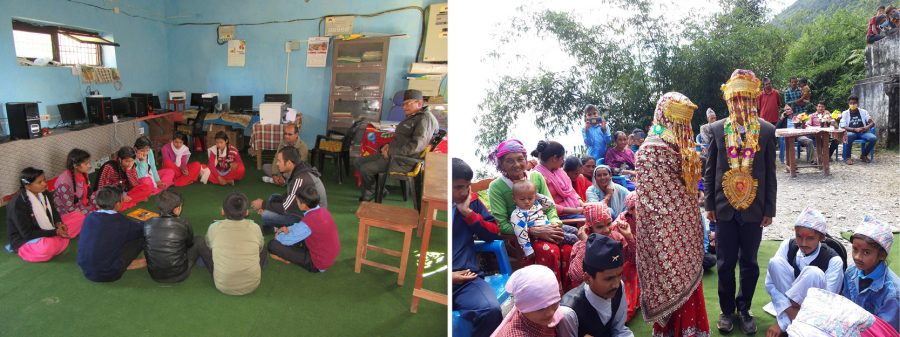
Interventions
- Mapping of child protection committees
- Formation/reformation of child protection committees
- Training for child protection actors, and local government officials
- Strengthening child case reporting mechanism
- Research/assess child rights issues
- Policies/guidelines formulation and implementing them at the local government level
Sensitized children who claim their rights
GNI Nepal’s child protection interventions aim at sensitization and promoting the participation of children so that they can deal with child protection issues at their home, school, and community. Children are powerful change agents and knowledge disseminators among their peers, family members, and community members. At schools and communities, children are organized into child clubs which are further organized into child club networks and under their aegis, they conduct/participate in extra-curricular activities and awareness-raising activities related to child rights.
Besides these efforts by children, at many GNI Nepal partner schools, continuous support for children, their clubs, and networks is required for enhancing their capacities, promoting their engagement in child rights campaigns, and dealing with the problems children face at home and in public spaces. School management committees also need to be sensitized on child rights for effectively managing children’s issues at school.
Capacity development of child clubs and networks will strengthen their knowledge, skills, and participation to deal with child protection issues at school, home, and in public. Complaint handling mechanism at the schools will give an outlet to problems troubling children and help them to seek solutions.
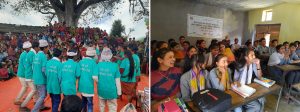
Interventions
- Formation/re-activation of child clubs and networks
- Capacity development of child clubs and networks
- Organization of awareness-raising/social action events through child clubs
- Life skills training for children
- Complaint handling mechanism establishment and operation
- Capacity development of children on complaint handling mechanism operation
Promoted preventive and responsive support systems at the household and societal levels
Children’s Act 2018 of Nepal highlights the responsibilities of parents, community, and institutions for protecting child rights including individuals’ roles and responsibilities for ensuring care, protection, and personal development of children. Wide disparities within communities in terms of socioeconomic standing, caste, ethnicity, gender, and education have resulted in challenges for the holistic development of children and in fulfilling their rights.
Our interventions will enhance awareness of parents, caregivers, and community members’ awareness of child rights and enable them to better care and create a conducive environment at home and in their communities. Issue-based social dialogues and advocacy events at the local and national level will inform and urge policymakers towards addressing the needs of children. Needy children and their families will receive immediate response and support.
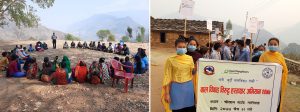
Interventions
- Community awareness-raising campaigns
- Training for parents, and community members on child rights
- Research/studies on child protection issues
- Advocacy events/social dialogues
- Immediate response and support for needy children and their families